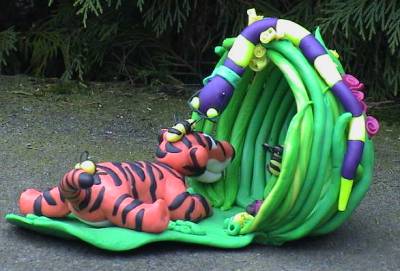* the clay is available in several colours and textures.
* it can be hardened in a kitchen oven, max. 130 degrees C or 265 degrees F (approx. 30 minutes).
* it can be hardened several times, allowing you to add things. The same hardening time and temperature.
* you can work at your creation several days, if necessary, everytime adding a new part. Cover it against dust.
* it is not necessary, but you can varnish or paint your creation.
* you can use it on many materials, like wood, iron, glass.

Disadvantages:
* polymer clay could pick up dust and other stuff from your work place so keep it clean.
* when hardening it smells a bit (this is the genuine polymer clay aroma and is absolutely harmless). Ventilate the room the oven is in. However, when polymer clay is exposed to temperatures of more than 392 degrees F (200 degrees C) a gas can be developed. Please read this...
* some colours, especially the darker ones, come off. So you have to wash your hands during kneading.
* it is not cheap, best to shop before you buy.